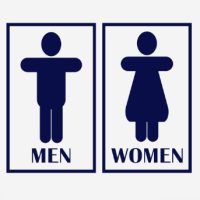Transgender Employees And Bathroom Access At Work: The New Battleground

If you are a transgender employee, you are probably aware that the Supreme Court ruled that transgender employees get the same protections as gender in general gets; that is, the same protections that require that women be treated equally in the workplace also require that an employer not discriminate against you based on your sexual identity.
Hence, many employers now know that discrimination against those who are transgender, or who identify with a different gender, is illegal, and an employee who feels he or she has been discriminated against because of sexual identity can sue.
Bathroom Access
While the Supreme Court case was a step in the right direction, a new battlefront in the workplace is emerging – bathroom access.
A lot of employers are prohibiting those who are transgender, from using the restrooms that they want to use. For example, a man who identifies as a woman, could be prohibited at work from using a women’s restroom. Bathroom access was not specifically mentioned in the Supreme Court case, opening the door for these kinds of prohibitions, but it is starting to get attention in courts around the nation.
The problem is that it isn’t getting enough attention. The result is a patchwork of cases that seem to say contrary things, coming out of courts across the country.
Public Schools
For example, a public school in Florida was held not to have discriminated against, when it prohibited a transgender student from using a men’s bathroom.
But students aren’t employees, so the question of whether it is discrimination in the workplace to prohibit a transgender employee from using a male or female bathroom, may be different.
Limited Authority Says Bathroom Access Must be Provided
The Equal Employment Opportunity Commission has said that employers can’t prevent employees from using bathrooms that match their gender identity.
Recently, in Illinois, an appellate court upheld a decision that found that Hobby Lobby discriminated when it refused to allow a transgender woman to use the women’s restroom while at work, despite the fact that the company itself had acknowledged her gender identity change, and despite the fact that the employee had changed her official documentation with the state to indicate that she was female.
But because she had not had sex reassignment surgery, Hobby Lobby contended that it was not discriminating against the employee, as “she” was still, according to the company, a “he.”
Free Speech or Discrimination?
There are even open legal questions that go beyond bathrooms.
For example, if an employer refuses to use “he” or “she” as a transgender employee might request, would that be discrimination? That likely would be, under the Supreme Court case, but there is still some dispute; a lawsuit against a professor who didn’t use a correct pronoun towards a college student was settled, thus leaving no guidance for employees or employers over whether that was discrimination or not.
Contact the San Jose employment law lawyers at the Costanzo Law Firm today if you feel you may have been discriminated against because of your gender, sex, or gender identity.
Sources:
news.bloomberglaw.com/litigation/transgender-florida-students-bathroom-access-undone-on-appeal
illinoislegalaid.org/legal-information/bathroom-access-and-gender-identity
natlawreview.com/article/illinois-appellate-court-affirms-transgender-access-to-restroom-facilities-largest
news.bloomberglaw.com/daily-labor-report/lgbt-battle-for-bathroom-access-pronouns-pivots-to-worker-suits
